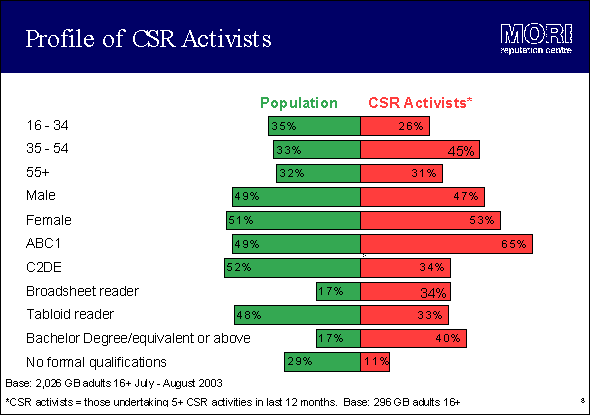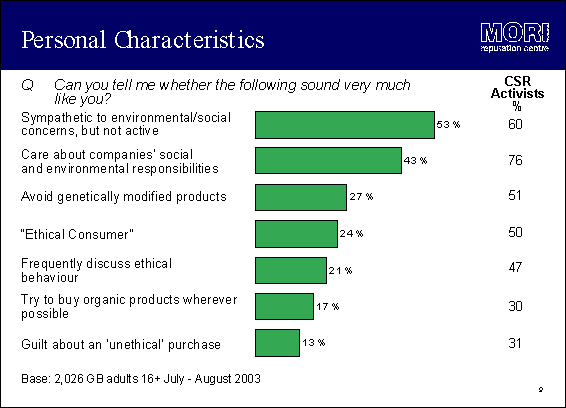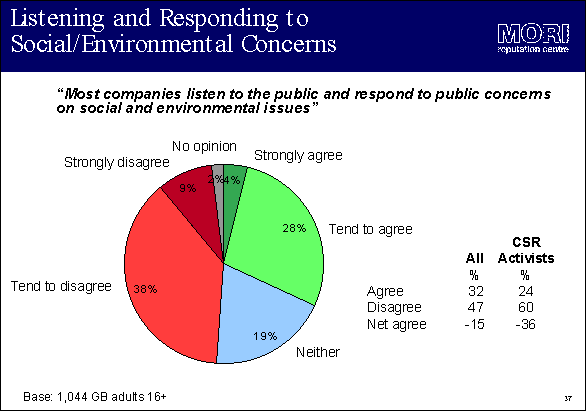Talk About CSR (But Don't Shout), Says UK Public
November 24 2003
As Corporate Social Responsibility (CSR) climbs the UK's political and social agenda, Britons are cynical about companies' performance to date, according to MORI Reputation Centre's Summer CSR study, part of the Key Audience Research programme. However, they are also keen to hear companies talking about it provided they don't spend a fortune on promotion.
Three-quarters (74%) of the British population say more information on a company's social and ethical behaviour would influence their purchasing decisions. Less than a third agree that 'most companies listen to the public and respond to public concerns on social and environmental issues', but 86% think that companies should actively communicate their community activities, and around six in ten (59%) say it is acceptable for companies to benefit from these activities.
TV advertising gets the most votes as an appropriate method of communicating companies' social and community activities, followed by press advertising, local and national PR activity. In practice, however, most people find out about such activities through personal experience, largely by word of mouth or by working for the company in question. Of the communication methods considered most appropriate, in-store communications are currently proving most effective in generating top-of-mind awareness.
MORI distinguishes what it calls a 'hard core of CSR activists' comprising around 15% of the British public. These are defined as people who have done five or more of the following ten activities in the last year:
- Donated money
- Given voluntary help to charity
- attended a local community event
- Bought a product because of a charity link
- Read / heard about company social actions
- Boycotted products on ethical grounds
- Chosen a product on company's ethical reputation
- Given blood
- Actively sought info on company ethical activities
- Invested ethically.
Whereas MORI points out that this equates to 15m people, readers who have been to the village fete, stuck some money in a tin and bought a free range egg may be surprised to learn that they are more than halfway to being a 'hard core activist', and arguably it's more significant that apart from donating money (71%) no one activity has been done by more than 38%.
However, if they are leading the trend towards greater awareness, they may well be an important focus for marketers as MORI's Jenny Dawkins, Director of the CSR Study, points out: 'Their beliefs and behaviours are significantly different to the population at large - for example, half of all activists say social responsibility is very important when forming a purchase decision, compared to 38% of the public overall, and they are more likely to describe themselves as ethical consumers (50% compared to 24% of the public overall). They are also much more aware of companies' community activities (67% compared to 37%) - as well as being more critical of them'. Compared to the population as a whole, 'activists' are more likely to be aged 35-54, from the higher social grades (ABC1), read the broadsheet newspapers and have a degree.
'Effective communication seems to be a missing link in the practice of corporate responsibility', says Dawkins. 'Despite the public's acceptance of - and desire for - more information on companies' CSR activity, only three in ten (30%) can name a company they consider to be particularly socially, environmentally or ethically responsible. Improved communication, especially at the point of purchase, or even mass marketing with an integral responsibility theme, may help close this gap'.
Whereas companies need to publicise their responsible policies, they need to be relatively discreet about it, judging by answers to another question. The public overwhelmingly believe that 'companies should make an effort to tell us but should not spend significant amounts' on doing so. 69% choose this option versus only 17% saying significant amounts should be spent and 9% saying no money should be spent (6% don't know). However, almost three in five (59%) think it is OK for a company itself to benefit from CSR contributions and not just those they are trying to help - versus only 32% saying it is not OK.
2,026 in-home CAPI interviews were conducted with British people aged 16+ between 7 July and 11 August 2003. Data is weighted to match the national profile and The questionnaire was 'versioned' to keep interviews to a reasonable length, therefore some questions are based on only half the sample. Further information is available from
jenny.dawkins@mori.com



All articles 2006-23 written and edited by Mel Crowther and/or Nick Thomas unless otherwise stated.


